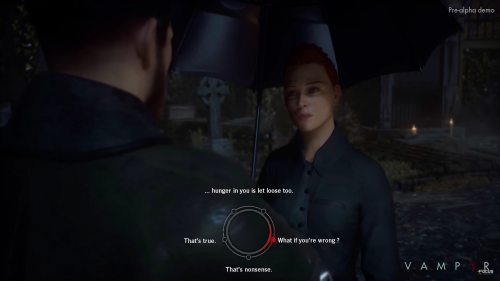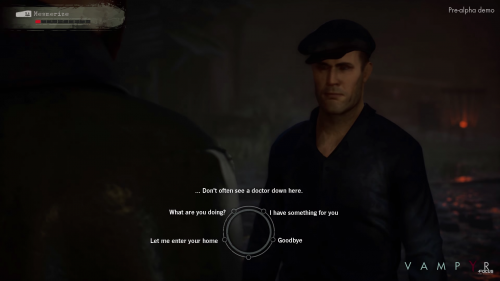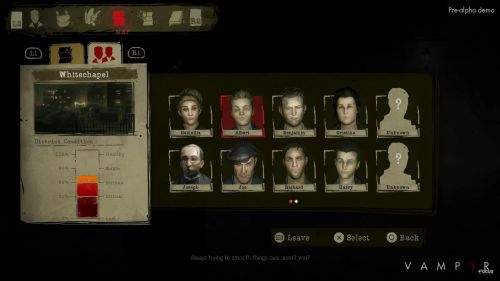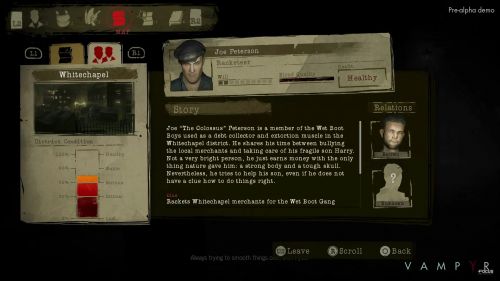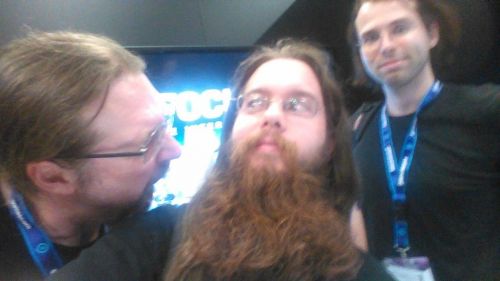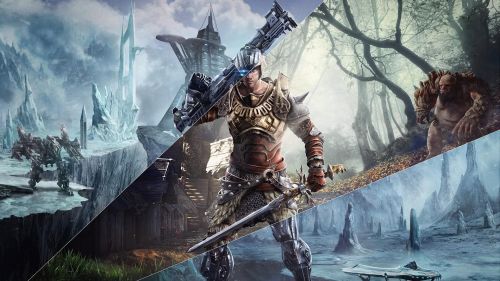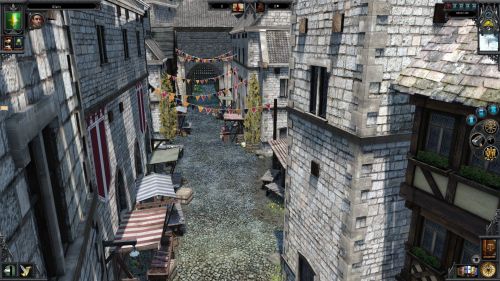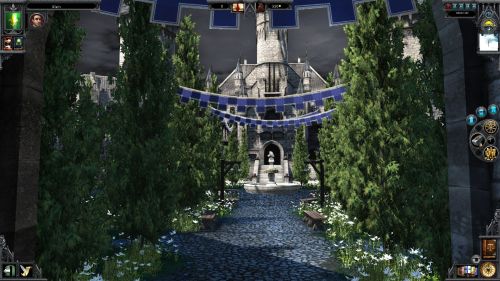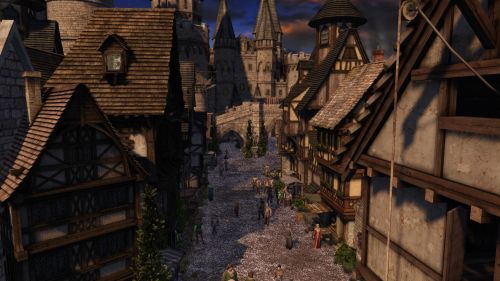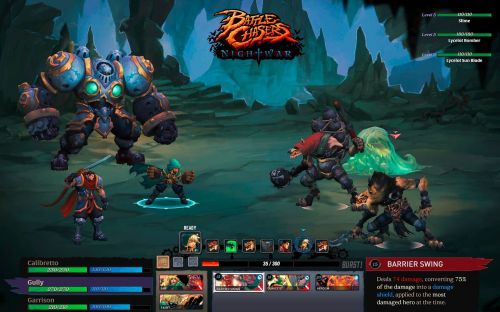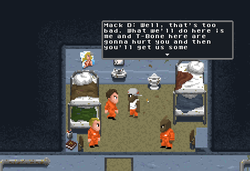RPG Codex Report: Gamescom 2016 - Vampyr, ELEX, The Guild 3 and Battle Chasers
RPG Codex Report: Gamescom 2016 - Vampyr, ELEX, The Guild 3 and Battle Chasers
Editorial - posted by Bubbles on Wed 23 November 2016, 19:17:25
Tags: Airship Syndicate; Battle Chasers: Nightwar; Dontnod Entertainment; ELEX; Gamescom 2016; GolemLabs; Piranha Bytes; The Guild 3; VampyrVampyr
Dontnod isn't only a palindrome, it's also the name of one of the hottest video game developers in Europe. Their blockbuster cinematic experience game Life is Strange has earned them dozens of industry awards, millions of sales, and the rapt attention of the global gaming press; these guys are playing in the big leagues now. So what are Dontnod doing with their newfound fame? They're making a story focussed third person action RPG about a brooding vampire who haunts London during the interbellum.
Vampyr [pronounced just like “vampire”] tells the story of Jonathan Reid, a brilliant surgeon who seems to have a bright future ahead of him – until that fateful day when he wakes up lying in a mass grave filled with victims of the Spanish flu. Jonathan soon learns that ~mysterious forces~ have turned him into a vampire, and he sets out to uncover the truth behind his condition. Will Jonathan find a medical explanation for vampirism? Can he develop a cure? Is his own condition somehow related to the spread of the Spanish flu? And will he be able to control his bloodthirsty urges long enough to find out? In his search for answers, our protagonist will explore the disease-riddled city of London; he will hold meaningful dialogue-wheel driven conversations with his priest and his psychiatrist, he will take various side quests from concerned citizens, he will scour through trash cans and paper boxes in search of crafting materials, and he will do battle against the secret order of vampire hunters who are eager to end his unholy existence.

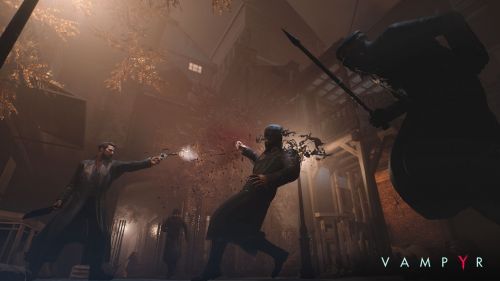
The shots in the official press kit won't tell you much about the gameplay. We'll be using blurry screengrabs from youtube from now on.
Combat and Dialogues
Vampyr's action combat is easily the least interesting part of the game's design, so we might as well get it out of the way first. The battle scenes we saw during the presentation [available on youtube] looked a bit like a third-person version of Dishonored; zoom towards a target, butcher them with a knife, shoot the next one with a gun, zoom to another target, etc. etc. Your character will also have access to a wide range of Awesome™ vampire powers, like shredding people into bloody confetti, impaling them on spikes made of concentrated darkness, or draining them of their blood at a distance through the power of telekinesis. It seems a bit odd to me that a game about a moody, ethically conflicted vampire doctor would place such a great focus on gory twitch combat; maybe that kind of stuff is necessary to attract modern RPG fans. Sadly, most of the game's battles will be unavoidable; the developers have repeatedly stressed that this is not a stealth game. The action combat is an integral part of Vampyr's design, and players will have to frequently engage with it if they want to play through the storyline.
Speaking of the storyline: Dontnod's games are frequently praised for their "cinematic" narratives, and Vampyr aims to continue that tradition. Our presenter Stéphane Beauverger (the game's Narrative Director) had previously worked on Remember Me, Rayman 2, and an unspecified project at Blizzard. For Vamypr, he told us to expect “a compelling storyline with intriguing characters”, with a strong narrative focus similar to Life is Strange. As a consequence, the presentation was quite dialogue heavy, featuring plenty of cinematic shots and prolonged periods where Jonathan talked back-and-forth with an NPC without any player input. When the player was offered a choice on the dialogue wheel, the text only presented a very curt summary of what the character would actually say. For example, the choice “I killed her” became “I… I'm the monster who killed her!”, followed by a few lines of non-interactive dialogue. From what I saw in the demo, Jonathan seems like a strongly pre-defined character whose personality and opinions are largely set in stone; the player is allowed to make certain choices on his behalf, but the actual impact of these choices on the storyline remains to be seen. Based on these short sequences, he feels much more like a Telltale protagonist than one from a Bioware or Troika game.
Choices and Consequences
So is there anything at all that Vampyr can offer to a cRPG fan? Is there anything even remotely complex or interesting about this game? Yes, there is. As I see it, Vampyr's biggest selling point is not about butchering hundreds of vampire hunters, or suffering through self-serious barely interactive dialogues; it's about meeting the NPCs of London, learning about their lives, and then choosing who among them should live and who should die. The designers have made the intriguing decision that sucking the life out of friendly NPCs should be the primary source of experience points in the game. Can't beat a difficult battle? Want to unlock a cool skill? Well, then you gotta find somebody you don't like, and get rid of them in a permanent fashion. Vampyr's version of night-time London will only be sparsely populated; in the demo, we saw that the entire Whitechapel district was represented by about twenty friendly NPCs. However, every single one of these NPCs is planned to be a unique, handcrafted character who will have meaningful relationships with the people around them; there won't be any faceless bystanders you can just slice open for easy xp. You will have to decide which characters you want to kill,, and the people who knew them will react to their deaths. Children will cry, mothers will weep, and London will run red with the blood of the innocent.
What a delightful idea for a gameplay mechanic! So many games try to string you around with easy choices: will you lie to this pregnant woman to get a slight reputation boost? Will you let two murderers run free to avoid a trivially easy battle? What nonsense. Vampyr teaches us that the most meaningful rewards must be earned through murder. You'll walk up to the people of London, introduce yourself, have a bit of small talk, learn about their troubles, overhear a whispered conversation from the shadows, maybe do a side quest for them, and then you'll get a chance to act as their judge, jury and executioner. Imagine a lady who has devoted her life to aiding the poor, but who secretly hates black people – stare deeply into her eyes, tell her to invite you into her chambers, and soon there's one less racist in the world. Or maybe you find that her sins do not outweigh her virtues; in that case, you might set your sights on the day labourer who steals from his employers, or on the father who beats his son. The criteria for a death sentence are yours alone to decide. When you kill a victim, you will even hear their last thoughts – “Who will care for my son now?” “I wish I had told Mary how I feel about her!” etc. etc. How shamelessly manipulative! It sounds like great fun.
And once you've done the deed a few times – ding! you've levelled up, gaining automatic increases to every attribute and two new skill points to spend as you please. But in case you get bored just playing Serial Killer Simulator 1920, the game is going to throw a couple of extra mechanics at you. According to Stéphane, every murder is going to have a meaningful impact on the state of the game world. The characters who knew the victim will find their lives changed; children will be orphaned, wives will feel rejuvenated, blackmailed shop owners will be able to thrive again. There will also be far reaching social and economic effects. Each district of the city has a “health condition” based on the average health score of all the citizens in the district. If a citizen gets infected with the Spanish flu, the district's health will go down a bit; if you lure a dozen of its inhabitants into a dark corner and suck them dry, the health will plummet. Once the score goes below a certain level, the district will irrevocably plunge into chaos; the social order will collapse, the remaining citizens will turn into vampires, all local side quests and shops will become permanently unavailable, and the entire area will turn into a nightmarish hellscape. Cool stuff, no? If for some reason you want to prevent that from happening, you can make use of your doctor's skills to cure the sick and the wounded in the area; that way, you can still claim a couple of lives for yourself without causing too much of a detrimental effect.
I'll tell you straight: this stuff sounds exciting to me. I'm not sure if Dontnod are actually capable of pulling it off, but the concept of being encouraged to judge and kill friendly NPCs – and of the game world reacting to each of your murders – feels quite fresh and interesting. Stéphane pointed out that you could theoretically leave all the NPCs alive and do a very difficult, skill-starved “challenge playthrough”, but that seems like a pretty dull way of playing the game to me. Better to approach a couple of NPCs, ferret out their innermost secrets, and then decide whether they're ripe for a sucking. Making these kinds of calculations seems far more flavourful and less anaemic than the kind of bog standard quest design we're getting from most other RPGs these days.
Interview
At the end of our appointment, we had an extra five minutes to grill Stéphane on some of the finer points of the game's design:
JarlFrank: So the best way to level up is to drink other people's blood?
Stéphane: Yes.
JarlFrank: Does this also apply to enemies you fight? You showed a battle against the vampire hunters where you can drink their blood. Will that also…
Stéphane: No, not at all! Because this is just a fight! You did not pick up a target and manipulate them to drink their blood…
JarlFrank: So you have to do this to gain xp?
Stéphane: You have to do this. You will get xp when you fight, of course, and when you perform quests, but the best way to level up is to drink the blood of someone. Now, you do have the right to finish the game without killing any citizens. It is the most difficult way, but it's possible; you can feed on the rats. But you will get no experience points.
Female audience member: Can you finish the game without fighting?
Stéphane: No, you have to fight. You can avoid some battles…
Female audience member: But you can choose not to kill them?
Stéphane: No. This is an important question; you can spare all the citizens. Citizens are the people just walking on the streets who believe that you are just a human doctor. The vampire hunters are your enemies; they are searching for you and you will have to kill them in battle. And they will not count for the Damnation counter you get each time when you kill an innocent victim.
JarlFrank: You say we will be able to kill all of the NPCs. How will that affect the story, if you just kill everyone and nobody is left?
Stéphane: There are two levels: the main storyline will ask you at some points to make what we call the “Major Killing Choices”: you will be asked to kill someone, or to spare them, or to turn them into a vampire, things like that. You have the choice to do that. Each time you have this Major Killing Choice, your decision will have an impact on all of the streets in all of the city. All the citizens will be affected by it. If you just choose to kill a citizen the death of that citizen will only impact people who knew him. It will not impact the main storyline; it doesn't go both ways. Otherwise I would just shoot myself as story writer, you know? It's impossible to create such a game.
But there will be consequences each time you kill someone. You will see, we have created evil characters – openly evil characters: people who try to beat their wives, or to… to… murderers. So it's easier for you perhaps to choose these bad guys. But you can let them live. And there are also very gentle people, perhaps with dirty secrets you can discover. There is no difference in Damnation points – there is no good reward because you killed a bad guy. [At this point he realizes that he forgot to tell us about Damnation points in the presentation] So, at the end of the game a [Damnation] counter will show you the number of people you killed, and you will get a different ending to reflect what you did throughout the game.
Bubbles: So you expect players to judge the characters and choose who deserves to live and who deserves to die, to be killed for experience?
Stéphane: We don't want the player to judge anybody! We just create characters – complex characters with secrets and relationships. It's up to you if you don't like that kind of person, if you choose to kill that kind of person. Just do it – it's okay! Most of the time, there will be no black and white characters; they all are shady. We have a rule when we're creating the world, that since the city is crumbling down, and most people are staying away from the disease, that the people who come out at night have a good reason to do so. So we have created four categories: the criminals, the crazy, the desperate, and the saints. These are the people who are mad enough to go out when there is vampire and when there is dead epidemic. So they are quite specific characters; quite special characters.
Bubbles: So if you're saying that not killing people is the most difficult way to play the game...
Stéphane: Yes.
Bubbles: …then I assume you're expecting people to play one of the easier ways, killing people?
Stéphane: I think it's natural, yes. Personally, I would like to try the game, and, the first time, try to not kill anyone. I know it's very difficult, because that means you have a character who doesn't get a lot of blood. So I'll be very fragile against the dangers of the game. That's the price to pay. It's always easier to go on the dark side.
---
We ran out of time and mental energy at that point, but I could have asked Stéphane a lot more questions. Killing people increases your “damnation” and the writer also openly uses terms like “the dark side” to describe the game's morality. Is killing NPCs “wrong” by the game's standards, even though it's an important gameplay mechanic and your primary source of character progression? He claims that there will be "openly evil" people you can kill – and yet, the writer's first example of “openly evil” is a guy who tries to beat his wife. He says that he doesn't want players to “judge” anybody, and yet he asks them to decide if and whom to kill; can these two attitudes be reconciled in any way? And since he personally seems to prefer killing a few people as possible, what kind of “evil” ending is he likely to write?
To be fair, it's pretty rare for a game to raise questions like these in the first place, much less during a Gamescom presentation. If the developers can really refrain from imposing a clear code of “right” and “wrong” on the game mechanics, if they don't smother the gameplay by stuffing it full of brainless twitch combat, and if their promises of meaningful c&c can be realized (and these are all very big “if"s), then Vampyr could actually turn out to be a pretty decent game. But even if it ends up being a terrible mess, its unique design ambitions should at least make it interesting to talk about.
Vampyr is scheduled to release as a multiplatform title in 2017.
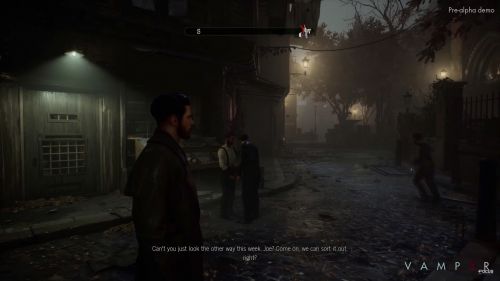
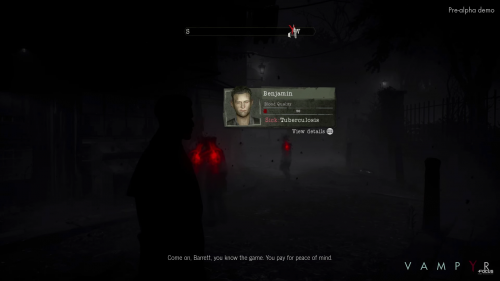
Jonathan also has some sort of "blood vision". I've never played Watch Dogs, but this reminds me of Watch Dogs.
Jarl's Impressions
This is one of those games I didn't expect much of when I went into the presentation, as I hadn't heard anything about it before and it started out a little too cutscene-heavy for my liking, but when it actually came to the meat of the game, it did sound pretty intriguing. I don't have much more to say than what Bubbles has already written up about it, and what you can read in the interview. Whether this game will be good or bad depends on one thing: does it actually manage to deliver on the choice and consequence it promises? The combat looks rather standard fare for an action RPG and doesn't do anything special to set it apart from the competition, but the massive amount of C&C can give this some replay value and put interesting choices before the player.
If every kill you make really has the promised effect on the world and on other NPCs, this game will definitely be worth a playthrough. This is, to me, the one feature it depends upon, the thing to set it apart from similar offerings. Considering that the team is experienced in making story-focused games, they might actually pull it off, although implementing massive amounts of C&C is an entirely different beast to telling a good linear story.
Let me just echo Bubbles' final conclusion again: this game will be interesting if they focus on the grey morality and C&C, but they'll have to take care not to smother the potential beneath a pile of filler combat, because the combat itself isn't great enough to carry the game. Vampyr is a game to be cautiously optimistic about.
ELEX
[all quotes in this article have been translated from the original German]
Due to an error by the PR agency, our ELEX appointment offered a rare quadruple treat. First we attended a 15 minute presentation of Piranha Bytes' new game by ex-JoWood producer Michael Paeck; this was followed by another 40 minute presentation + interview with the developers Jenny Pankratz (a designer and writer) and her husband Björn (the Project Director). Afterwards, I had a half-hour hands-on with the game in a public booth, while Jarl fulfilled a childhood dream by taking a group photo with the Piranha Bytes team. That's a lot of coverage for such a mediocre-looking game!
Seeing over 90 minutes of ELEX is enough to melt any man's brain, so I'll keep my summaries of the various events as concise as possible. During the presentations, we learned many things that we had already known from last year's presentation: ELEX is going to be a massive open-world RPG in a post-apocalyptic science-fantasy world. The impact of a giant meteor has destroyed most of the world's human civilization; the survivors have split into various factions, who are constantly squabbling with each other. At the centre of all these conflicts stands a new element called “ELEX”, which was brought to the planet by the meteor. According to the presenters, “ELEX” is miraculously versatile; it's a power source, a construction material, a potent drug, a dangerous mutagen, and the planet's main currency. I got the impression that “ELEX” could do just about anything the developers wanted it to do.
In terms of gameplay, ELEX looks fairly similar to the Risen and Gothic series; you'll be exploring a “fully handcrafted world” that's “about one and a half times as large as Gothic 3”, with lots of secrets and hand placed loot strewn about. The developers promise that there will be no loading screens and no invisible walls; from snowy mountain peaks over ruined highways to scorching deserts, every location that can be seen in the world can also be travelled to. Exploration is aided by a super cool jetpack, which will allow you to land on rooftops and scale cliffsides. If you want to travel across longer distances, you can use the game world's extensive network of teleporter pads.
Apart from the exploration, much of your game time will be spent whacking various types of humans and monsters. ELEX's combat system offers a wide range of melee or ranged weapons, as well as a bunch of magic-like powers. Players can use swords, clubs, grenade launchers, laser pistols, and all sorts of other cool stuff; you will also have a variety of options to craft and upgrade your weapons. The enemies you encounter will not be level scaled.
So what about the core RPG elements of the game? Well, the developers are promising us “many opportunities for role playing: you can stand on top of a cliff to enjoy the view, you can use blankets, you can open doors, you can cook meat at the campfire, and other things that one associates with classic role playing games.” If this still isn't enough old-school RPG goodness for you, ELEX will also offer you quests with multiple solutions, a faction system with mutually exclusive quests, more choices and consequences than in previous Piranha Bytes games, a day/night cycle with NPC schedules, a trainer-based skill learning system that requires you to find experts in the world, and a selection of recruitable companions.

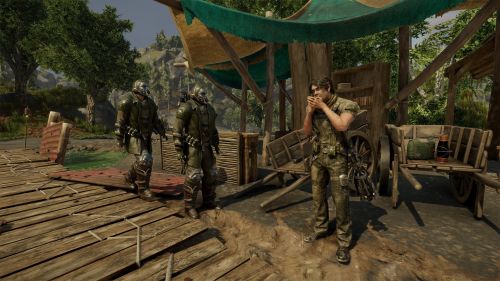
Piranha Bytes are promising to deliver a large, handcrafted open world with an entertaining mix of fantasy and sci-fi elements. We'll see how that works out for them.
Hands-on Impressions
To be frank, the presentations did not give me much hope for ELEX. The game sounds essentially like a refined and slightly evolved variation on the established Piranha Bytes formula, and this formula has not been producing any good results lately. I liked the first two Gothic games a lot, but those games were made over 13 years ago; many of the people who worked on those titles are no longer with the studio, and the few who remain have adapted to the demands of a new gaming market. Nobody should expect these developers to be capable of producing another Gothic 2 again; it's far more fitting to judge them on the basis of their two most recent games instead. Risen 2 was one of the most wretchedly off-putting RPGs I've ever encountered; I thought it played, looked, and simply felt significantly worse than any of Piranha Bytes' previous games, and I was mentally incapable of finishing it. What little I played of Risen 3 offered no hope of improvement; it seemed more like a shallow time waster than a challenging and engaging RPG. Why should I assume that ELEX could be different?
The demo certainly didn't make me feel optimistic about the game. The version in the public hands-on booth was a very early, very rough pre-alpha version; I'm not sure if it was a smart idea to make it available to the public [video here]. I'm struggling to say anything good about my gameplay experience; the controls felt clunky both in and out of combat, the animations were bad enough to be distracting, the AI seemed rudimentary at best, and there were only minimal opportunities to talk to people. The few dialogues I had followed the typical Piranha Bytes style: voiced male player character, limited choices, simple lines, simple reactions, lots of swearing. These games have never been praised for their complex dialogue systems, and it doesn't seem like ELEX is going to change that.
The most entertaining gameplay element was the jetpack; hovering down into a deep ravine and trying to get myself stuck on one of the slopes before my fuel ran out was relatively fun, and climbing onto rooftops to look for abandoned containers at least offered some novelty value. The ranged weapons are also a good idea in theory – properly aiming the grenade launcher against moving enemies was actually quite challenging, even though the weapon felt way too weak compared to a normal metal sword.
On the other hand, melee combat is a fairly standard “dodge around, mind your stamina bar, attack your enemy when they're not defending” affair, though the limited stamina combined with the poor controls felt very annoying to me. The best strategy was to simply fly straight up with my jetpack, and then fall down while holding the attack button for a special attack; flying was easier than dodging, and the enemy AI seemed to have a hard time dealing with me while I was above them. ELEX also offers a melee combo system, but I never figured out how it was supposed to work. Overall, the melee combat felt too awkward to be fun; the final version of this system would have to be play very differently to be enjoyable to me.
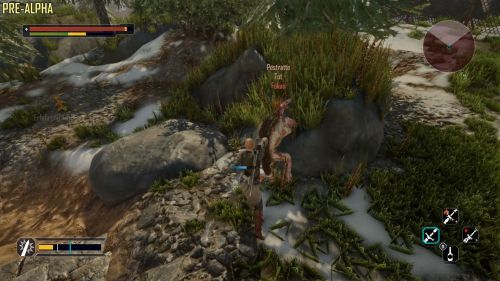
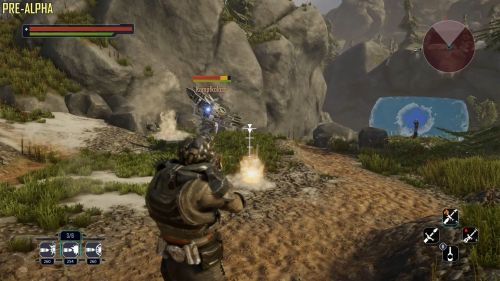
ELEX's combat offers an unusual amount of variety by Piranha Bytes standards. Let's hope it'll be fun to play at release.
Interview
After our presentations, Björn and Jenny were able to spare another 25 minutes of their time for us. The Codex had talked to Björn once before, in a barely-remembered e-mail interview about Risen 2 in 2011; we were hoping that this one would be a bit more insightful. Björn was in the odd position of having been a key member of the original Gothic team (good) and a lead designer on both Gothic 2 and its expansion (also good), as well as a lead designer on Gothic 3 and the entire Risen series (not so good). Now he was making ELEX. What kind of a game should we expect from a man with such a diverse portfolio? Jarl and I had differing opinions on the subject.
Jarl: So basically this is a kind of sci-fi Gothic?
Jenny: If you want to call it that…
Jarl: So it's an attempt to return, also in terms of design, to the “old-school” Gothic 1, 2, 3, Risen 1, in that direction?
Jenny: In many places, yes. Especially in terms of this immersion aspect. We got lots of feedback, especially from the community, who said… “rework the combat” – we've created a completely new combat system, with separate melee and ranged combat systems. The melee combat is a bit “Dark Souls”-inspired in terms of options; you can right click, you can do a heavy blow, you can block, you can turn a block into a counter attack, the combat is more direct, we have included stamina as a tactical element, I can dodge…. In ranged combat, there are different types of weapons and ammo, different enemies react differently to different types of damage. ...this isn't in the demo yet, but later on they'll also aim a bit differently.
You'll be free to select your own tactics, and you'll encounter a steeper difficulty curve. We now have a fully open world again, which makes it easier for us, because we can say “this guy is so tough, he'll kill you in one blow, but if you get the right equipment, you can try taking him on”. That's how it was back in the earlier days as well. This way we can designate areas, let's call them “level 1 areas”, with easier, younger, smaller monsters, and then open up the world like that.
And we also have more options to configure the game: “Do I want a combo in this timing, or do I want a different timing?” “Do I want the mini-map, do I want to do without it?” And everybody can put together the playing style they want; we show people how we want it, and if you want it differently, you're free to set it that way. That was a demanded feature, because there are lots of different types of player; the guys who just want to enjoy the story, and those who say “nah, I want to really hard”. And to accommodate that, we'll also have four difficulty levels on top of that. And we're doing away with those things that pull you out of the game. Quick Play Events? Gone! Ship battles? No! You'll always stay in the world; you'll interact with that thing on your arm, your [inaudible], when you want to open your inventory, so that everything is a bit more deeply integrated in the game world, so that the player feels more deeply immersed.
Jarl: You've also said that you can get into a city in different ways, by bribing a guard or finding a back door – basically, that you can solve quests in different ways. Is that generally true for most of the quests in the game?
Björn: Yes.
Jenny: Yes. That's something we wanted.
Björn: You can do lots of things in the missions in different ways; you can choose the aggressive, fighting options too, if you want. Take the outlaws in front of the city; we want to get inside the city, but the guard won't let us inside without an ID card. The outlaws are promising you an ID card if you do something for them. And one of the gate guards will tell you to get rid of the outlaws, you can side with him instead. So you can choose between one side or the other. Or you can say: “Okay, I'll try playing both sides and see how that turns out.” For example, you can lure the gate guard away from his post, towards the outlaws. And while the outlaws are fighting the guard – and that'll take some time, because he's a tough Cleric who's really strong – you can still decide which of the two sides you want to side with. And that changes the outcome of the story.
And we have lots of things like these in the game. Everything you do, every line you say can be important. And depending on which side you ally with, you get to see the consequences. But you can also change your decision, you can say “Do I really like these guys?” and then make another choice. That was really important for us: freedom of decision making, freedom of movement, huge world, barrier free continent – huge world! – and the new combat system.
And we didn't want everything to be so “deterministic” – no scripted scenes! It may be that a monster walks by and attacks somebody, or it walks near the guards and they come running and kill it – these kinds of things will happen.
Jarl: What about the borders of the game world? It's really cool that you can go everywhere, even to the top of the highest mountains! Gothic 2 was laid out so that you had the water on one side of the map, and the mountains blocking off the other side…
Björn: Yeah!
Jenny: That's exactly how we're doing it here! Your jetpack has an energy limit, and the mountains, at their highest point, are just a little bit higher than you can fly. And that's the end of the world. And the ocean is like in Risen; you swim around in it for a while, but at some point you reach the end.
Bubbles: This connection between the genres [gestures at the promotional art shown above] – this medieval armour and the melee weapons together with this super high-tech stuff – it seems a bit of a double edged sword to me. You can imagine people looking at this and saying “This doesn't fit together at all!” Like seeing a healing potion next to a high-tech teleporter. Of course there's an appeal to that kind of genre mixing, but it seems difficult to find the right balance to create a credible game world.
Björn: That's the challenge!
Bubbles: Right, exactly! What do you think of this challenge so far?...
Jenny: We think it's...
Bubbles: ...Do you think you can do this?
Björn: [bursts out laughing]
Jenny: We think it's great! I mean, you can see what things look like, and we think it's basically just like on Earth. When you go to different places, some people still have access to the old technology, and other people have absolutely nothing. What do they do then? They start gathering plants and try to survive. And the others keep on going in their cool bunker. Exactly the same thing would happen on Earth. And we believe that, as different as we are, why not... [her husband gets her attention]… yes?
Björn: On the question of balancing these different elements, you have to ask yourself: Darth Vader is a knight, and he wields magic, and he's inside a Star Destroyer… and that's plausible. But as soon as you do it in an obvious and striking fashion, like saying “We've putting medieval and science fiction elements relatively close to each other,” that's a strange thing at first sight.
A-ha! But for a medieval group of people, a bit like the Amish people maybe, it's a question of mentality for them. It's part of their signature. They don't want to exploit the planet, they want to terraform it. And so they invest all the energy they get from ELEX – ELEX is the glue that keeps the entire world working, it's the only remaining energy source, and it's also the source of magic. That's how a faction like the Berserkers, who don't have technology but have powerful abilities, can have a chance against these machines and so forth.
I understand that question – I mean, at first glance, this is naturally… [gestures at the artwork, shrugs] …, but this world is built so organically, and we've heard a lot of voices… there are a lot of voices who say “it'll be interesting to try something like this”, and they don't categorically reject it, and they think “okay, this is interesting.” And we thought the same thing. We've had this concept in our heads for nine years now, to do something weird like this. And in [THQ] Nordic we've found a partner who's doing this together with us. And the result is fun.
Bubbles: How big can the contrasts get? Is there really high tech stuff in the game, like… a working nuclear power plant?
Björn: Something similar, yes; the converters. The Alps, who are sort of the antagonists of the setting, they also have stuff like gliders that fly around – they're very high tech. They consume ELEX, and that makes them emotionally cold; very rational. And they build these kinds of power stations. They call them “converters”, and they throw in everything that contains ELEX, including people and animals. They have big power lines that lead north to their great palace… You know, the important thing is that... technology is good, but there are also a lot of free people, who are finding their own way to use ELEX. Be it magic, or stims, or building machines.
And you choose your own path in dealing with all these factions. And the game ends in lots of ways; the fate of the world – what happens to the world? –, your own fate – what role will you end up playing in the world? –, your companions, their fate – depending on how you play they may like you or not. Maybe they'll leave you. All the main characters, like guild leaders or city leaders – they have an opinion of your playing style. What kind of person you are, how far you tend towards machines or humanity. That's important because we want to present this game in a plausible way. Plausibility is a big issue for us, so of course these questions are totally appropriate. But give the game a chance – we've put a lot of things into the game that look strange, but they work. Like Darth Vader and the Stormtroopers.
Bubbles: Of course, you still need to accept that all of those pre-apocalyptic machines still work…
Jenny: Yeah, that's why it's science-fiction! But if you like science-fiction, and if you like fantasy….
Björn: ...then you'll like this game!
Jarl: It reminds me a bit of these cool Wizardry games from the 90s, y'know? I've been waiting for ages to see a game that combines these settings again!
Jenny: Yeah, we have lots of options: in combat… in dialogues, we can use modern slang, because the previous civilization was similar to our. So we don't have to pay attention to…
Björn: ...in contrast to the fantasy setting, which we used before...
Jenny: ...so we can use modern words, we can use audio logs – we don't have to write letters all the time! We can construct the world differently! We can build different objects!
Björn: We can write different missions! Just with machines alone, the kinds of things you can do... it's a lot of fun.
Jenny: That's it; we're basically doing what we've already been doing, and then adding something new on top. That gives us more options, and it's simply exciting.
Jarl: So, the world is 1.5 times as large as Gothic 3, which was your biggest game to date – how densely are you going to fill this world?
Björn: We were planning this from the start, because we are really keen on this hand-made stuff. Then we saw the world, and we thought, “oh god, have we put too much on our plates?” But the more we worked on the game, the more we realized that we weren't too far away from the kind of games we had made earlier – in terms of pacing and so forth. And it's working beautifully. We have lots of characters in the world you can interact with, lots of missions… it's cool.
Jarl: So you have a world 1.5 times as large as Gothic 3, but in terms of density roughly on the level of Gothic 2?
Björn: Yeaaaahhhh….. roughly…
Jenny: That's hard to say, in part because we have an open world where we don't force the player to move along designated paths. You see something interesting over there, you walk over there. You look up there, see something interesting, so you walk up there. That's different from making the player follow pre-set paths. And as a result, the pacing feels different… it's hard to describe. But you can try playing it...
Bubbles: One more question, a nice one: what does your target demographic look like? I can imagine a Fallout 4 fan looking at this and saying: “okay, I don't want to have anything to do with shooting mechanics like these.” Basically, with which concrete features are you planning to appeal to people in today's gaming landscape?
[Jarl and Björn erupt in laughter]
Jenny: Err…. we believe that we have strong ideas, and… and... this is a vision that we ourselves…
Björn: This is a very provocative question, and… how do you give an answer to that? We believe that this is fun. This is an open world RPG where you have lots of options. With Fallout, you're focussed on a very specific subtype, the post-apocalypse; we have a very versatile setting, where you can simply do more stuff. But they also include building sim elements, and so on. To compare our games and to say, “these guys are making total rubbish and we are really great” makes no sense at all. All games have a right to exist. We believe that ELEX is fun, and of course it's also interesting to people who like games like Fallout.
And of course the setting makes a big difference. Take a game like Witcher, which has a medieval setting, where people use really old-fashioned language, where they have medieval executions, because that kind of thing must be in the game... well, these kinds of things… ahem… [meaningful pause; Jarl laughs]. We take advantage of the fact that we can combine things, and create something very, very interesting.
Our target demographic? Our target demographic goes from very young to very old. It's always been very diverse. We appeal to gamers who like “what you see is what you get.” You are in the world, you can interact with everything, NPCs have their own lives – it's a simulated world. When you talk to somebody, the dialogues aren't staged; you don't suddenly get a fade to black and the characters are standing as if they were in a movie. No, when you talk to somebody, you'll be standing exactly where you were standing before. If he was standing on a staircase below you, he'll still be standing below you. Yeah, that's the appeal.
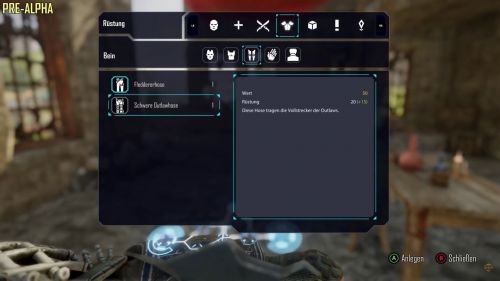
An early version of the inventory screen, courtesy of World of Risen. Note how it's being projected from a device on your wrist - highly immersive!
Jarl: One final question perhaps: The Gothic games have always been focussed on the open overworld, but dungeons have been a bit neglected. Do you have larger dungeons now?
Björn: Dungeons in the sense of a large underworld? No. We're focussing on the overworld. We do have dungeons, a lot of them even, but if you expect to find a “double world” below, then I'd answer “okay, but that'll take us another two years.”
Jenny: There are lots of ruins where you can explore the cellars, cave systems… that sort of thing. But the focus is on the overworld.
Bubbles: Okay, one last question from our community: we've somehow managed to write the harshest, most damning reviews of the Risen series on the net [specifically, Risen 2 and 3; all credit to Darth Roxor]. And the people who are reading our articles are thinking: “I hope this game will not be like Risen!” If somebody made that statement to you, what would you reply?
Jenny: We get this stuff a lot. We get lots of fan mail, we get private messages, people are sending us their own game ideas, and… yeah, it's always a compromise between...
Björn: ...just... just try to tell them what the difference between the games is.
Jenny: Haven't I already said that?
Björn: Doesn't matter, say it again!
Jenny: There was a huge community outpouring of suggestions, and we implemented those suggestions. No more Quick Play Events... – not to mention that we didn't really like those ourselves –...
Björn: Large Continent! Large Continent, battle system... these sorts of things really distinguish Risen from what we're doing now.
...I know what these people mean. These are things that you either like or dislike. Okay. Of course you need to look at each criticism in detail and figure out what exactly they did not like. But we have gone through all of our systems, we have changed things, and we have received a lot of good feedback for what we have done so far. I believe we've got a good feeling for what people like and what people don't like. And this thing is really cool, it's mad fun, and… let'em take a look at it. Let'em take a look.
Jarl: Well, from what you've shown us so far, it really looks like you're saying “Okay, we're now gonna serve you a big fresh helping of Gothic 2!”
Bubbles: [rolls his eyes in a shameful betrayal of his partner]
Jenny: No, this is no Gothic.
Jarl: ...different, but in terms of the principles, of the level design….. ….? …??
Jenny: Well, it's… it's... One is one thing, and one is another. We have deliberately not made a new Gothic. And we think that it would have been a bad idea to make a new Gothic 4 or 5. At the current time, at least. Why? You ask three Germans: “What should the new Gothic have?” And you get at least five different answers. The expectations are there: [raises her arm real high]. And we cannot meet them. Even if we wanted to – if we hired 25 new people – it would not be possible to release a Gothic – right now! – where people would say “whoa, that's great!” Not possible. “Basically, we want exactly what's been done before, but not what's been done before!” And that doesn't work.
And so we thought: let's rather do something that we've had in our heads for a long time anyway, something that we would enjoy making, something where we can use old gameplay mechanics that worked well, which we really liked, where people are saying “that was great!” – we take those on board, and we make a new setting with fresh ideas, a new story that nobody is familiar with, and then we make a great game. And that's ELEX.
Bubbles: Nice monologue.
Jarl: Yup.
[long silence]
Jarl: One more question!
[laughter]
Jarl: So, one more comment on the presentation: at the start, I was thinking “Okay, the last two Risen games weren't quite so great anymore.” But after what I've just seen, I must say that I'm very, very optimistic.
Jenny: That's great to hear… and we have the same feeling. We should mention that our release date is at some point in 2017, and we'll be doing all the console versions in-house this time.
Jarl: Oh, we're only interested in PC, so...
Jenny: Yeah? Yeah, you're old-school… but there are lots of options...
Björn: I need to mention that there were many decisions that we had to accept. For Risen. Many decisions were not ours. Nothing more needs to be said.
----
Over to JarlFrank.
Jarl's Impressions
Cautious optimism is kind of a theme in this issue of "Codex Gamescom Report 2016", as it is also appropriate for ELEX, the new project by semi-beloved developer Piranha Bytes. The Gothic games, even the third one with its many bugs and flaws and one or two idiotic design decisions (seriously, who came up with the chest loot system?), were great action RPGs with solid systems, excellent exploration and some amount of C&C in the form of different joinable factions. Gothic 2 has, to this day, not been surpassed in its particular subgenre.
Risen, too, was a good game. Pretty much a straight up Gothic 2 clone, just that the protagonist had a different haircut, but that's what made it so good: it didn't make any major changes to a formula that worked.
Risen 2 and 3 were huge disappointments because they removed precisely what made the Gothics work so well.
This time, it looks like Piranha Bytes learned their lesson and are going back to the design principles that led to their success and fame. The world is going to be seamless and open again. There are different factions you can join, each focusing on a different playstyle (technology, melee combat, magic). Exploration is free and unrestricted, you can go anywhere you want and nothing is off limits.
Also, the game totally sounds like another Gothic 2 clone, no matter how often the devs told me that it was going to be an entirely new thing. Sure, the setting is different, but there's still three factions and it begins with you being a loner having to find a way into the first major city and pretty much the entire beginning segment we were shown looked like "Gothic 2 in space!!" so yeah. This is pretty much Gothic with Guns. And it is the game that will have to show the world that Piranha Bytes still got it. After the disappointing sequels to Risen, they have to prove that they can still work the same kind of magic that made the Gothics so great.
From what they told us, they might actually deliver. As I already mentioned, they're going back to the freeform exploration in a big, open, seamless world with hand-placed encounters and loot and tons of stuff to discover, no linear shit whatsoever. The jetpack allows for vertical exploration more than any previous PB game. Getting into the city has multiple possible approaches, just like getting into Khorinis in Gothic 2. Their answers to my interview questions flipped all the right switches for me. I want to believe. Elex might actually Make Explorefag RPGs Great Again.
Of course, there were also a few details that seemed a little worrying. The combat didn't look half as tight as it was in the original Gothics or the first Risen. They mentioned that the game world is going to be larger than Gothic 3's, and I really hope they manage to fill it with enough interesting hand-placed content to not make it seem empty.
But, honestly, those are the only things to worry about. If everything they promise is going to come true, this is a return to form for Piranha Bytes, and Elex is - next to Kingdom Come: Deliverance - the exploration-focused action RPG I'm looking forward to the most.
The only really horrible thing about it is the pronunciation of the name. It sounds ridiculous. Who the hell came up with the name "Elex", anyway? This is one question we sadly neglected to ask.
They should've gone with "Gothic with Guns" instead.
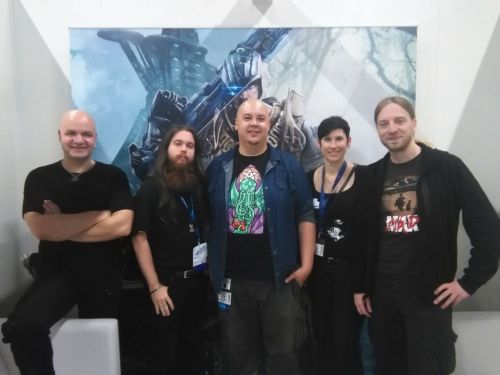
Jarl and the assembled Piranha Bytes team. Björn Pankratz on the far left, Jenny second from the right.
The Guild 3
[all quotes in this article have been translated from the original German]
Ah, the Guild series. These games aren't really RPGs, but they come close enough to be enjoyable in my book. The Guild games are medieval life simulators: you pick a profession like farmer or bandit, strut out into the filthy streets of a 15th century European city, and then you can set your own goals to have fun in this terrible, wonderful world. You'll probably start by plying a trade to become wealthy and gain social status. Then you can try to land a wealthy spouse, have a bunch of children to continue your dynasty, lose all of them to disease, and make some new ones. You'll gain friends and enemies, manipulate the legal system, fabricate evidence, commit terrible crimes, bribe the judge to avoid the death penalty, and perhaps become a judge or politician yourself. You can get your biggest enemy thrown in jail for a murder that you yourself committed, and then run for the office of dungeon master so that you can personally torture them. The Guild games have many of the same charms as the Crusader Kings series, although the large-scale politics and warfare mechanics of those titles are here replaced with a stronger focus on personal advancement, crafting and trading, city politics, and social interactions.
Last year I spoke to a representative of the developer GolemLabs, as well as the game's producer Heinrich Meyer from THQ Nordic. This year, only Heinrich was present, but we managed to have a fairly in-depth conversation anyway. The producer began by telling us about the scope of the game: The Guild 3 would feature a total of 12 different city maps, each of them larger than the cities in The Guild 2. The character progression would be xp-based, with a system of titles that served as “a sort of level system”; you'll start as a serf, and gradually advance to the status of Commoner, Yeoman, Resident, and Citizen. Afterwards, you may plot to join the nobility, become a member of the city council, or even become your city's sovereign, which is the highest position attainable in the game.
Each new position unlocks additional powers, which can range from social interactions (complimenting people works wonders when you're a member of the nobility) to professional privileges like being able to hire a guard, to new political powers, like the ability to vote or to stand for high office. You can do some really nefarious stuff, like embezzling money as the Treasurer or “mishandling” some of the city's weapons as the Arsenal Master. As you rise through the ranks, you'll accumulate more and more enemies, and they'll have access to the same tools as you, including the ability to frame and assassinate their opponents. Eventually your character will die, and not necessarily of old age. Afterwards, you'll take control of his children to continue the dynasty from a slightly less powerful position. If you have no children left, the game ends. But never fear – if you have enough money, you can always buy an orphan at the local church.
Your character's personal abilities can be mixed and matched in a flexible system of skill trees. Almost every activity in the game – from crafting horseshoes to throwing firebombs at your rival's house – gives you a certain amount of xp, and these points can be used to buy a new skill that unlocks new abilities. You may choose to advance in the profession that you chose at the game's start to learn more profitable blueprints and recipes, or you can pursue a completely different tack instead, depending on your current needs. Heinrich didn't offer too many details about the amount of available skills and abilities, but he promised that The Guild 3 would have the same scope as “Guild 1 and Guild 2 combined”. That would make for a very meaty experience full of different options for developing your character. The game is still in late alpha, and thus not feature complete; let's hope that we'll be able to get more concrete information about the scope of the gameplay closer to release.
Since the features from the first two games are already so massive in scope, Heinrich didn't promise a lot of genuinely new stuff; there would be an expanded mechanic for plague and disease, and there was a new system of societies that would cause additional social strife in the cities, but these did not sound like hugely important additions to me. But that's alright; The Guild 2 came out way back in 2006, and it had so many bugs and engine problems that a slightly larger, more technically robust sequel would be very much appreciated.
Interview
Heinrich was gracious enough to give us a full 30 minutes of interview time to talk about the game; sadly, the first half of the interview has been devoured by a malicious machine spirit. As such, I can only summarize the few important bits that I remember from the first ten minutes of our conversation.
Like its predecessors, The Guild 3 will have a compressed time system. One day and night cycle represents a full year and season; you'll start in Spring 1400, then advance to Summer 1401, and so on. One of our community members thought that the day/night cycle in The Guild 2 was a little too fast for his tastes; they wanted to know whether it would be slowed down a bit for the sequel. Heinrich responded that the cycle in Guild 3 would actually be about 10% faster than before, lasting about 22 minutes instead of 24. Another poster wanted to know whether your rival dynasties would be less aggressive in the sequel; Heinrich argued that the rivals in The Guild 2 had actually been too tame for his taste, and that they would be more aggressive this time around.
Thankfully, these two were the only major questions that were lost on the tape. Most of the really in-depth stuff is still available to posterity:
Bubbles: We had a discussion on our forums about the fact that the Guild games are still PC-exclusive, even in this modern age. Why is that – is the UI too complex for consoles?
Heinrich: ...we once tested a version [of an earlier Guild game] on the Xbox; it worked, but the controls were terrible. And it's the same way now; you can make a port to the newest Xbox relatively quickly – so we could get a version for the Xbox One or Xbox 360 pretty quickly – but we see absolutely no way of implementing a proper control scheme with a gamepad. It's just impossible. The game is too complex.
[At this point he notices that Jarl is making inefficient deals at the marketplace, and spends a minute showing him how to do it properly] You should buy a cart to transport your goods… slow down the game speed! No, click there… now, click this first, and then here…
Bubbles: It's nice that these kinds of games are still being made.
Heinrich: Another nice thing is that you can enable first person in the game. If you keep the middle mouse button pressed… [the game switches to a pretty looking first person view while Jarl's character is running around the city]
Bubbles and Jarl: Ohh…. ahh….
Heinrich: Of the few people who've been allowed to check this alpha out so far, a lot of of them have spent most of their time in first person view.
Bubbles: A question from the community: will the political and legal systems be similar to the one in The Guild 2: Renaissance?
Heinrich: The Guild 3 combines the political systems from Guild 1 and 2. We're returning to a chamber system, – of course there were also chambers in Guild 2 – but now we're returning to the system where a chamber controls a certain set of laws and privileges. There will be votes and similar stuff.
Bubbles: I like the way the GUI looks. Compared to The Guild 2, it seems a bit more atmospheric, but still functional.
Heinrich: I'm happy to hear that. We still have certain issues to fix and design decisions to make, and a few new features to add as well. And we still have eight more maps to add, and voice over lines, a couple of texts here and there… but we are approaching beta stage. Visually we are nearly where we want to be – a few of the rooftops still look iffy, a few weather effects need to be added, but otherwise we're pretty far advanced.
Bubbles: When were you planning to release this game?
Heinrich: Ah…. we still maintain that it should be possible this year, but we will officially announce a date in the near future. [No new information has been released so far.] I can not give you a clear statement about the release date yet, but we have always maintained that we will only release the game when we consider it to be finished.
Bubbles: And that is still possible?
Heinrich: That is still possible. Of course we will have to release it at some point – for financial reasons – but we will not do things like they happened at JoWood, where it simply became necessary to release a game because the funding ran dry. Nordic… err, “THQ Nordic”, as we are now called, has a totally different set-up. Most importantly, we want to maintain our reputation. We have a reputation of not releasing any buggy disasters. If it's necessary, we will invest more money and take more time. That's painful, but our reputation is more important.
Bubbles: I asked the same question last year…
Heinrich: You have. [laughs]
Bubbles: ...but I think it's important to ask it again, especially for fans of the Guild series. I think it's necessary.
Heinrich: It is. It is. I think you know a bit about producing games now. [laughs]
[silence]
Bubbles I notice that you gain experience pretty quickly in this game.
Heinrich: Well, you can quickly gain your first few titles, but of course the costs escalate. If you hover over the skills in the skill tree with your mouse, you can see how much xp they require. We've done a pre-alpha test with a few carefully selected people; I noticed things like “Okay, it took them ten minutes to become a citizen, and they earned so-and-so many xp in that setup. I don't want them to become citizens within ten minutes, so...” That's the first, rough balancing pass – but there'll be a closed beta and lots of other tests. A lot is going to happen before release; I think we'll end up with a very well balanced game.
Bubbles: Sounds good! What about modding? Are you still open to the same ambitions you had at the start of the project?
Heinrich: We will release the editor… we are not sure if we will release the editor with the game, but later with a patch. The editor is not just for creating maps, it's to manipulate the complete settings.
Bubbles: Can you make new jobs?
Heinrich: Yeah.
Bubbles: How easy will it be to import a texture or model into the game through the modding tools?
Heinrich: That will not be possible. We have decided against that… no, not “decided against that” – it's not possible with this engine. We're using the engine from the Darksiders games, which we have heavily modified for this project. We've had a lot of problems with rendering shadows and the horizon, but GolemLabs have overcome those challenges. The editor will allow you to make your own custom professions, but you will always have to use the pre-made models.
That said, we are currently considering to release a set of unused assets together with the editor – something like five extra buildings or something. Maybe you want to make a Fisherman profession – that one won't be in the game – and you can use one of those models for his hut.
Bubbles: Oh, I'm sure there'll be DLC for new models...
Heinrich: … that's not in our plans, no. We are planning other DLCs… we don't know exactly what those will be, but to start pulling mini DLCs out of our pockets… no. We don't do that. This isn't the right game for that anyway. We're delivering a complete game with all of the scope of Guild 1, of Guild 2, and all of the add-ons, as well as an editor.
Bubbles: Ooof! Not even Sid Meier does that anymore.
Heinrich: Correct. We'll be doing different things with our add-ons. Completely new scenarios perhaps, that kind of thing. We're not quite sure yet. Right now we only have settlements in middle and northern Europe – everybody can build Venice, but he'd have to use the northern European half-timbered houses for that. Maybe we'll offer a complete “Southern Europe” package later on. Time and the comments from our fans will show what we'll do.
I'm personally in contact with the fans on boards, on facebook, and in other ways. I've been with The Guild since the year 2000, and I'm still in contact with the people from the olden days… I think we've made a game that people will enjoy.
Bubbles: If you're saying that the scenario editor will be coming out after release does that mean that they might be delayed by, say… half a year?
Heinrich: Yeah. That's possible. You see.. we want to finish the game. Right now, the editor only has to be good enough that we can work with it. The editor is functional – otherwise we wouldn't have any content to show you – but it's still buggy, flawed, and terribly “unfriendly” to use. And we won't delay the game just to polish the editor. So if the worst comes to pass, we will have to delay the editor and patch it in afterwards.
----
I really rather liked that interview, and I enjoyed everything that I've seen from The Guild 3 so far. The straight talk about THQ Nordic's DLC plans seems like a particularly pleasant change from the business practices of certain other major publishers; let's just hope that Heinrich will make good on all of his promises.
The glimpses I saw of the demo gameplay also seemed pretty solid to me; they're not graphically dazzling, but the gameplay looks deliciously complex, free-form and dynamic. But I'd better hand things over to Jarl at this point, because he's the one who actually got to spend a full half hour with the demo.
Jarl's Impressions
Well, this looks to be shaping up pretty well. The interview was an unusually straightforward affair with little buzzwords and marketing speak; instead, there were in-depth answers on the development process, game design, and what the devs learned from the fan community. Heinrich really seemed like the kind of guy who makes niche games for a niche audience and knows how the audience ticks, and is willing to communicate closely with them. While Bubbles asked questions about the game and its development, I played around with it a little, trying out different things and making a little progress in the game.
My previous experience with The Guild is limited to having played Guild 2 for a few hours a couple of years ago, and my memory of it is far from fresh. What I've played here seemed very true to its predecessor, though - a sequel that does basically more of the same: same core gameplay, all old features intact, and some cool new stuff added to it.
I started out by creating a character; choosing a female baker, I immediately got to buying corn to turn into bread, then sell it on the market to buy more corn to turn into more bread. Doing this levels up my skills, and when I did get a level-up I looked into the extensive skilltree the game has.
While not everything was implemented yet, of course - the game is in an alpha stage, after all - the sheer size of the skill tree is quite impressive. It's impossible to become proficient at everything in one playthrough, so the game offers you many paths to success and a lot of replay value. In my thirty minutes of hands-on gameplay, I earned enough money to build another building, but of course it wasn't nearly enough time to get to the more interesting parts of the game.
What I really liked from the presentation we were shown, but didn't get to do in my short hands-on time, is the possibilities of sabotage you have if you play a thiefy kind of character. You can buy a bomb and blow up your competitor's house, for example... and might even be caught if you're not careful.
Really, it's just what a sequel should be. More of the same, with some improvements and additions, and anyone who enjoyed the previous Guild games should enjoy this too. Back in August, when we got to see the game hands-on, it was still a long road to completion, but since then there has probably been some progress. I liked Heinrich's attitude about the game and its development: if it needs some more time, he said, it will have to get a little bit more time, because he doesn't want to release a buggy product. That's a good sign and we can expect a solid game that expands on its predecessors once The Guild 3 is released.
Battle Chasers: Nightwar
This is a pretty lightweight blend between an action RPG and a jRPG. It features procedurally generated dungeons with procedurally generated loot, an engaging story that is faithful to the universally beloved “Battle Chasers”
However, the game's strongest distinguishing factor (and the reason I booked this appointment in the first place) is the fact that the battles take place in a turn based jRPG style, switching from top-down view to a side perspective. This is a rather unusual design decision for an western RPG, and I wanted to figure out how it played in practice. JarlFrank got more hands-on time with the game than I did, but from my limited experience, I can say that it felt a little off-putting. At first glance, the system looks like a pretty standard 2D turn based system: your party is lined up on the left side of the screen, the enemy is on the right, and then you keep trading standard attacks and popping special abilities until one side is dead in the dust. There's an initiative bar and a respectable amount of stats and status effects. In a word, Battle Chasers has everything you'd need for a good turn based combat experience.
Sadly, the demo playthrough seemed a bit repetitive to me. I felt like I kept doing the same things to the same limited amount of enemy types again and again and again, and the amount of versatility and tactical depth seemed relatively poor. This is not at all unusual for a Diablo-style dungeon crawler, but most of those games are in real time; the fast pace and the constant click-click-click gameplay are pretty effective at papering over the fundamental simplicity of the gameplay. As a turn based game, Battlechasers gave me a bit too much time to think about its shortcomings.
Indeed, the biggest benefit of our presentation was that we got to chat with a minor game dev celebrity. The game's director Joe Madureira has gained a surprising amount of nerd fame thanks to his time as the penciller on Marvel's Uncanny X-Men series; later, he founded Vigil Games, where he served as Game Director on the universally beloved Darksiders franchise. He has more twitter followers than Chris Avellone and Josh Sawyer combined! Sadly, neither I nor Jarl had the slightest idea who he was; Jarl didn't even indulge in his pathological habit of selfie-taking, which I know he is sorely regretting right now. In any case, Joe was a charming and affable host who talked to us at great length about the game's mechanics, and even sat down with us after the presentation to chat a bit about his memories of Baldur's Gate 1. Battle Chasers doesn't excite me at all, but Joe seems like a nice kid; I wish him all the best.
Battle Chasers: Nightwar is currently headed for a multiplatform release in mid-2017.
And really, if the guy who made flippin' Darksiders is making a turn based RPG, then what the hell is stopping today's Obsidian from doing the same thing? Get with the times already! The future is turn based! Over to Jarl.
Jarl's Impressions
Well, I don't have too much to say about this either. I found the animations to be a little bit too long - combat might grow a little tedious after a few hours thanks to that - but it looked like a solid game, and a good entry to the "rogue-lite" genre. I got to play the game hands-on for a bit when we talked with Joe, and I had reasonable amounts of fun with it that were only marginally marred by having to use an inferior input device (fucking controllers, man...). I'm quite sure that the game will be even more enjoyable with real input devices.
There's isometric dungeon exploration where you can switch between the characters in your party (one character represents the entire party on the dungeon map, and you can switch between them; each character has a special ability that makes traversing the dungeon easier). There are traps, and you can lure monsters into them to damage them before combat, which is a cool feature. The combat itself is typical blobber combat (or like typical JRPG combat but I wouldn't know about that because I never played a JRPG before), and each character has his own set of combat abilities to use against the enemies. Overall, there's not much to say about it other than it's a solid rogue-lite game.
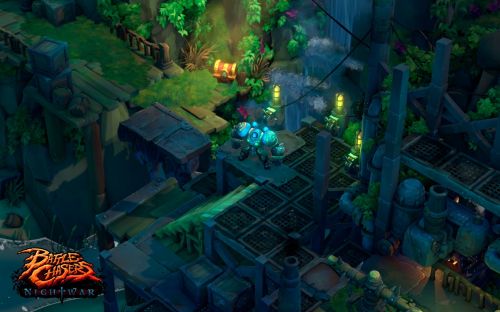
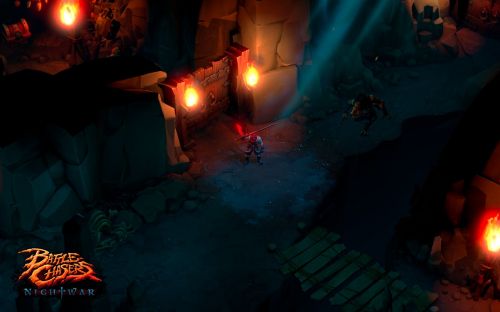
Exploration and looting are presented from a top-down perspective. I hope you can turn off all those blur and smear effects.
Coming up next: our final six games of Gamescom! Featuring Pathologic, Demons Age, Regalia, Shock Tactics, End State, and The Great Whale Road.





